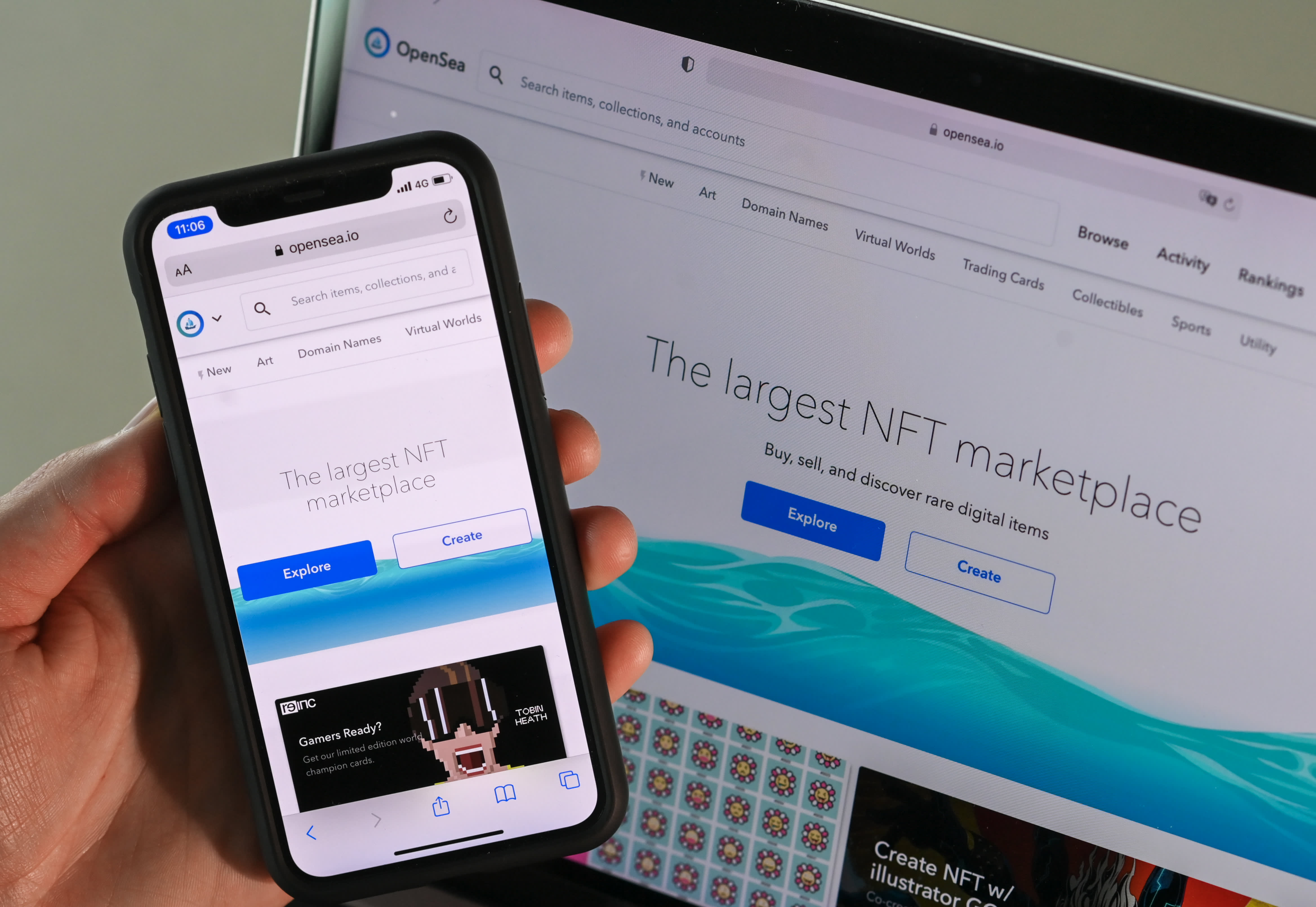The King of Chum
The man behind the AI gaffes at Sports Illustrated and USA Today has a yearslong history of filling the internet with garbage. Continue reading…
/cdn.vox-cdn.com/uploads/chorus_asset/file/25523941/Hanneke_Rozemuller_Advon_lede.jpg)
In the summer of 2018, staff of the Chicago Tribune awoke to find a story they didn’t recognize on the newspaper’s website. The article, multiple sources say, had something to do with a purse carried by Meghan Markle, the royal also known as the Duchess of Sussex.
Advertisements frequently masquerade as news articles at the bottom of actual journalism — this is the phenomenon some have dubbed “the chumbox.” But this article about Markle’s purse was, in terms of where it was hosted, how it was formatted, and where it was appearing, truly in the Tribune — its online edition, at least. Yet this was not what one would expect to run on the site of one of the most prominent newspapers in the country. It was more suited for a gossip rag or blog, a type of “as seen on celebrities” article pushing product. It clearly did not meet the paper’s editorial standards. (One person with knowledge of the article recalls that Markle’s name was misspelled.)
The piece was pulled down quickly after leadership at the company was alerted to it. When Tribune staff inspected the article in the site’s content management system, they discovered something curious: the piece had been published by BestReviews, a consumer product reviews website whose content was syndicated on the Tribune.
This incident was highly unusual. A few months before the Markle story was published, Tribune Publishing, the company that owned the Tribune, acquired a majority stake in BestReviews. The relationship between the Tribune and BestReviews was courteous. BestReviews staff published their work on a separate site and also republished work on chicagotribune.com, a fairly standard syndication deal with no issues until this point. The Markle article was in contrast with established protocol: BestReviews shouldn’t have pushed new types of content to the Tribune site without discussing it with staff at the paper. After the article was published, top executives at Tribune Publishing called up and questioned BestReviews leadership, multiple people who worked at the companies, said.
Tribune staff were confused by what had happened, but it was explained to them as a fluke. After the article was pulled, boundaries and standards were reiterated to Ben Faw, a cofounder of BestReviews, and staff moved on — it was an odd incident in an era of far bigger scandals at Tribune Publishing.
Unbeknownst to most, though, the article was, in fact, a piece of marketing content promoting a shopping startup founded by one of Faw’s friends, according to a person familiar with the situation. Faw did not dispute this when The Verge asked about the story.
Fast-forward to today, and a different media scandal has roiled the publishing industry for the last year and a half: the frenzied proliferation of web content generated by artificial intelligence tools.
In October, The Verge and other outlets reported on product review articles appearing on Gannett publications like USA Today that seemed to be AI-generated. Gannett maintained that the content was produced by humans and that a third-party marketing firm was responsible. Just a month later, eerily similar review articles were published on the website of Sports Illustrated, but this time, Futurism discovered that the article authors’ headshots were for sale on an AI photo website. Shortly after, Sports Illustrated said it had cut ties with the company that produced the reviews.
The apparent AI content proved embarrassing for nearly everyone involved: venerated publications that hired a third-party marketing firm to produce content were now attempting to defend the work — and themselves — after readers discovered the low-quality junk content on their sites. Workers who had nothing to do with the stories feared it could be the beginning of the end of their jobs. In January, the Sports Illustrated newsroom was gutted by mass layoffs, though much of the staff was later rehired after its parent company found a new publisher.
In both cases, as reported by The Verge, the AI-generated content was produced by a mysterious company called AdVon Commerce, a marketing firm that boasts of its AI-powered products. There’s little information available about AdVon online, as its owners have worked to scrub their names from the internet.
“I literally saw that headline about Sports Illustrated, and I was like, ‘I bet Ben did that.’”
But AdVon didn’t come out of nowhere. For years, according to former colleagues, internal documents, and court records, a person behind the operation has seemingly used his connections in the media industry to enrich himself: Ben Faw, CEO and cofounder of AdVon. For Faw, AI-generated sludge was just the next tactic to do so.
Faw has a stacked resume that he regularly highlights: a US Army veteran and West Point graduate, he went on to attend Harvard Business School and lists previous jobs at companies like LinkedIn and Tesla on his LinkedIn page. But to some who worked with Faw before he started AdVon, it was no surprise that the shoddy AI content was traced back to him.
“I literally saw that headline about Sports Illustrated [The Verge’s story],” one person who worked with Faw says, “and I was like, ‘I bet Ben did that.’”
Online marketers focused on Google Search traffic live and die by “reputation” — being seen as a reliable, trustworthy publisher in the eyes of Google leads to better placement in search results, which, in turn, leads to more clicks, more sales, and more eyeballs.
One of the signals Google uses to assess the reputation of a site is backlinks, or how often other trustworthy websites link to a site. The idea is that publications are legitimized by how many others cite them. The bigger the website, the more authority it bestows on links, at least in the world of SEO, where links are like currency: marketers inundate reporters with pitches, hoping to get mentions and links in stories. The shadier SEO specialists buy, sell, and trade links, a practice that Google prohibits.
In mid-2019, BestReviews staff began to notice that unfamiliar backlinks had been placed in content that was already live on the outlet’s website, bestreviews.com. The hyperlinks were numerous and largely unrelated to the articles they appeared on. They led to other blogs about pets and lawn care, OB-GYN practices in Ohio, and beauty product companies, according to documents reviewed by The Verge.
But the seemingly random links had something in common: Faw was somehow connected to many of the companies being promoted. A cosmetics company called Beauty Bakerie, for example, was linked to dozens of times. Faw is described as a board member of the company in a biography published online.
It wasn’t just the links to Beauty Bakerie that raised the alarm. Interviews with former associates, internal documents, and court records obtained by The Verge paint a picture of a complex web of companies involved in a backlink scheme, with Faw seemingly at the center.
Some of the links involve a company called Alan Morgan Group, a digital marketing firm based in Ohio that was cofounded by Eric Spurling, the cofounder and president of AdVon and a classmate of Faw’s from West Point. The firm’s services include “getting [clients’] content featured on the front page of some of the best-known digital newspapers” and search engine optimization. According to two people with insider knowledge, BestReviews had hired the firm to do SEO work for the website.
Faw was confronted about the thousands of links inserted into BestReviews’ content
In reality, Faw and others involved with Alan Morgan appear to have set up an elaborate, self-dealing system that used Faw’s connections to BestReviews to enrich themselves. According to interviews and internal documents seen by The Verge, hundreds of links placed in BestReviews stories went to clients of Alan Morgan. Though BestReviews had hired Alan Morgan to improve its SEO, in practice, it was more like Alan Morgan clients were getting SEO services in the form of plum, potentially lucrative backlinks from BestReviews.
According to documents seen by The Verge, Faw was confronted in June 2019 about the thousands of links inserted into BestReviews’ content, including links that didn’t make sense in context: the phrase “trauma shears”’ linked to Beauty Bakerie; a link on “learn more here” led to a different consumer reviews site.
When Faw was asked about the links, he claimed that someone at Alan Morgan Group had inserted the links, according to multiple people with knowledge of the conversations. The relationship was terminated.
What wasn’t known then, even to some senior BestReviews staff, is that Faw was allegedly employed by Alan Morgan and held a one-third equity stake in the company, according to a lawsuit filed by former business associate Jonathan Smith, a copy of which was obtained by The Verge. In the suit, Smith accuses Spurling and Faw of fraud and conspiracy, claiming the two ran off with money, intellectual property, and clients of his business as they spun up a dizzying number of companies — including, eventually, AdVon. Smith did not respond to requests for comment, and the case is now closed, per the court’s website. Interviews and documents suggest that Faw was employed at both Alan Morgan and BestReviews at the same time, in what appears to be a clear conflict of interest.
There are other threads in the links that, once pulled at, unravel and seem to lead back to Spurling and Faw. On one of the backlinked sites, dog-gear.com, an “About Us” page describes a “founding team” with a background that bears a striking similarity to Faw’s resume: West Point, Harvard Business School, Fortune 500 companies. An archived version of a DogGear author page indexed by Google lists “editor@advoncommerce.com” as a contact email. In his suit, Smith alleges that Spurling spun up a company called Pet Gear LLC, a company designed to link publisher’s content with Amazon affiliate links “in a way that would maximize revenue for the publisher,” according to the lawsuit. In the suit, Smith also requests financial documents related to dog-gear.com, though it’s not clear that the site is operated by Pet Gear, founded by Spurling.
Another site called Better Lawns and Garden was also linked to more than a hundred times, according to documents viewed by The Verge. The site publishes articles like, “The Best Potting Soils for Proper Plant Nutrition” and “Tree Felling: How to Safely Remove a Tree Yourself.” The pieces are written by a person named Mike Dover, who, according to the LinkedIn profile listed on his author page, works for AdVon.
The competing reviews sites were especially strange, implying that Faw, while working at BestReviews, possibly spun up competing review sites and linked out to them hoping to take advantage of BestReviews’ prominence and Google standing. Some of the outside reviews sites mirrored BestReviews’ own content: an archived version of the FAQ page on dog-gear.com from April, for example, is nearly identical to an archived version of BestReviews’ FAQ page from May.
At least once, this linking practice spilled over to the Tribune site as well. According to a person familiar with the incident, some time after the Meghan Markle purse story appeared and was removed, a Tribune web editor noticed a weird link inserted into a BestReviews article that was syndicated on the Tribune’s website.
“It was just a normal hyperlink to, I think, a dentist or some sort of private business in the South,” the person told The Verge. “It made absolutely no sense in the content.”
Like the Markle article, the addition of the link was traced back to BestReviews. Tribune staff quickly removed the hyperlink, and an executive called BestReviews to discuss the rogue link. After that, the source says, safeguards were put in place to prevent it from happening again, including limiting BestReviews’ CMS access.
“In both those situations we noted it quickly — we had somebody minding the store,” a former Tribune staffer says. “We saw that something wasn’t right, we took care of it immediately [and] wiped it out.”
Hedge fund Alden Global Capital acquired Tribune Publishing in 2021, after BestReviews was sold to Nexstar. Reached for comment via email, spokesperson Davidson Goldin didn’t answer questions related to the piece, saying that the events in this story predate Alden’s acquisition.
But at BestReviews, no one noticed the links until months after they were inserted, according to a person who worked at the company. The idea that Faw allegedly had created competing reviews sites — some of which directly ripped off the work of BestReviews — while still working at the company he helped build was shocking.
“No matter how you feel about a company, who does this?” they said. “Who cheats like this?”
Faw was prominently featured in a recent Futurism report about AdVon’s numerous publisher deals. The outlet reported that AdVon’s product review content had appeared on sites ranging from the Los Angeles Times to Hollywood Life and Us Weekly, attributed to writers that don’t exist. The articles, with titles like “Best Yoga Mats” and “Develop Your Core Using the Best Ab Roller,” contain paragraphs of stilted, unnatural-sounding language, with links leading to Amazon product pages, earning a small commission every time a reader purchases an item. They are essentially sales pitches dressed up to look like news articles or product reviews.
After both the USA Today / Gannett and Sports Illustrated debacles, AdVon denied claims that the product reviews were AI-generated. But when pressed by Futurism about documents that showed AdVon staff using AI, the company backtracked, saying automated tools were in use at least for some publishing partners. Still, many of the outlets cut ties with AdVon due to the quality of the work, Futurism reported.
But a former AdVon employee told The Verge that the content that AdVon says is created by humans is nearly identical to the AI-generated content they created while working there. Freelancers who were initially hired as writers were reassigned to roles of editors and tasked with making AI-generated writing sound human. The tool AdVon used — called MEL internally — generated hundreds of words on products using bare-bones prompts like “best televisions,” spitting out links to product pages on Amazon.
“I looked at [MEL’s output] the first time and I just fell apart,” the former AdVon worker says. “Everything we were working towards — all that education, all of the writing experience … it was gone. There was none of the human journalistic writing. It was just, generate a bunch of words that we hope will look like a good article.”
Faw and Spurling did not directly respond to The Verge’s questions about the details of this piece. Instead, Faw sent a statement saying AdVon is helpful to newsrooms and “generate[s] affiliate revenue which publishers use to fund newsroom operations and salaries.”
“AdVon offers human-only, AI-enhanced, and hybrid solutions to help our customers with this problem,” the statement continues. “We’re committed to working closely with our publishing partners to ensure that their optional use of our AI solutions meets their content standards in this quickly evolving space.”
Since the widespread availability of AI tools, news outlets have been at the center of conversations about artificial intelligence: Is there an ethical way to use them? How should outlets signal to readers when AI is involved? How can workers and human labor be protected?
Product reviews specifically have felt the effects of AI
Product reviews and commerce content specifically have felt the effects of AI: across many outlets, it’s been this type of service journalism that corporations have unleashed AI “experiments” on first. At CNET, AI tools were secretly used on content meant to sell credit cards, insurance, and other products and services before readers and media caught on. At The Inventory, a site owned by G/O Media, a bot has published dozens of stories a week highlighting Amazon products that are on sale since company leadership announced its plans to use AI. At both Sports Illustrated and USA Today / Gannett, third-party articles with all the hallmarks of being AI-generated were published alongside the work of human journalists.
The degradation of product reviews and recommendations is ironic given it’s often some of the most profitable work for media companies: each time a reader makes a purchase through a link in a story, the outlet gets a small kickback through affiliate revenue. Established review sites like The New York Times’ Wirecutter or niche interest blogs might not uncover corruption or break news, but readers care about that work — at their best, reviews are trustworthy, rigorously researched stories that help people make decisions about their lives. They also bring in money for news outlets.
By all accounts, the work of BestReviews while under Tribune ownership struck that balance. BestReviews was cofounded by Denis Grosz and Momchil Filev in 2014 and quickly built an archive of lucrative product reviews that earned the outlet money each time a reader made a purchase from an article. Grosz and Filev declined to comment for this story. Nexstar, the media company that acquired BestReviews in 2020, also declined to comment.
Multiple former BestReviews staff tell The Verge that they produced quality work, made by real people who cared about journalism. Articles were written by subject matter experts, or at least people who had an interest in the topic and were willing to do research about products and actually test them. There was a test lab, in-house photo and video teams, and editorial standards. To this day, BestReviews promises that it doesn’t accept payment or free products “in exchange for positive reviews,” therefore remaining unbiased.
“It’s not like Pulitzer Prize-winning content that we were doing,” a former BestReviews employee says. “But truly the mission was: save people money by giving them an honest review, pros and cons, and give them a few options based on different budgets.”
“We didn’t put out just a fluff piece or advertising for the [manufacturers],” another former staffer says. “We didn’t really take a bias towards a certain company. We kept our standards.”
But the work produced at AdVon was different. A former staffer told The Verge that when they wrote articles, they were simply creating marketing materials for brands that had hired AdVon to promote their products. There was no testing of gear or even selecting different models to compare; writers simply got a list of products and were tasked with rewriting Amazon product listings into articles. Another person who worked at AdVon described a similar experience using the AI system, in which MEL selected the products featured in the articles for them.
“[It was] promotional listicle content articles. It would be like, ‘10 best backpacks,’ and then they would have a list of backpacks promoted by companies that they were trying to support,” a former AdVon staffer says. “Most of this was to try to break through [search algorithms] so that that content could be promoted through SEO.”
Publishers are leaning into product review content, hoping it will buoy a sinking ship
While reputable outlets review and recommend products without fear or favor, an army of lower-quality blogs, content farms, and influencers push similar content that’s designed only to generate sales. “Best of” lists can be a cash cow for publishers looking for evergreen content that drives traffic from Google, and manufacturers stand to benefit from the press mentioning and linking to their products. As publishers stare down the barrel of Google Search traffic drying up to zero, outlets big and small, trustworthy and less so, are leaning into product review content, hoping it will buoy a sinking ship. But the ecosystem of online reviews is essentially the Wild West.
One of the countless companies promising to help brands get publicity via product reviews is called SellerRocket. The company markets to Amazon sellers who want their products mentioned in recommendation lists or reviews. SellerRocket says it has “helped more than 4,000 brands get coverage.”
In one webinar posted to YouTube, a SellerRocket employee explains to prospective clients how the company can get their products featured in news articles and reviews. They pull up a Sports Illustrated review of ab rollers — authored by “Damon Ward,” one of the fake AI authors created by AdVon — saying the magazine is a “publisher we work with.”
They then show that the best ab roller article is ranking highly on Google Search. Clicking on the story, the employee says, “They always lay out how they went about their grading process, why they chose what [products] they did.” There’s no mention of AdVon, but the article includes a familiar disclaimer: “Sports Illustrated and its partners may earn a commission if you purchase a product through one of our links.”
It’s not clear who selected the items appearing in AdVon’s product recommendations or why SellerRocket boasted of its success using an AdVon article. But according to Utah public records, the registered agent for a company called Seller Rocket shares a name with an operations specialist working at AdVon. SellerRocket didn’t respond to questions about its relationship with AdVon.
If any of the Sports Illustrated or Gannett content featured clients that paid for placement in reviews, that financial relationship wasn’t clearly disclosed to readers — which, if true, would be a violation of Section 5 of the FTC Act, which prohibits “unfair or deceptive acts or practices in or affecting commerce.”
The SellerRocket website previously listed the logos of BuzzFeed, Forbes, Wirecutter, and BestReviews, implying they were SellerRocket clients. Faw and Spurling did not respond to questions surrounding the use of these logos.
“Wirecutter has never done business with SellerRocket. The use of our logo was misleading and factually incorrect and we had them take it down via a cease and desist order,” Jordan Cohen, spokesperson for The New York Times said in an email. Forbes spokesperson Jocelyn Swift and BuzzFeed spokesperson Juliana Clifton also told The Verge that the outlets have never worked with SellerRocket.
SellerRocket has since removed mention of those publications from its site.
By drawing on his deep network in media and product reviews, Faw was able to land deals with premier publishers like Sports Illustrated, USA Today, and McClatchy newspapers like the Miami Herald. The seemingly AI-generated content that was described as human-made lost AdVon business, and the publications running the work issued naive-sounding statements. Sports Illustrated, for example, said at the time that AdVon content was not AI-generated but that the listed author names were fake, leading the publisher to drop AdVon. After revelations that Sports Illustrated had been publishing content attributed to fake writers, the outlet’s then publisher ousted CEO Ross Levinsohn, a serial media executive who worked at Tribune Publishing around the time Faw was at BestReviews. (Levinsohn left the company after NPR reported he had been sued twice for sexual harassment, with both cases ending in settlements.)
In the time since the controversy erupted, Faw and Spurling have removed their names from the AdVon website.
But for the writers hired by AdVon to actually write, the company’s business practices have had lingering effects. One former AdVon worker told The Verge of having work dry up as they were instructed to use AI tools, so much so that eventually they couldn’t continue to do work for the firm.
Another former AdVon writer — who maintains they didn’t use AI while working at the company — says that because AdVon has deleted so much of its work, they’re unable to find their human-written clips to show potential clients as work samples. Some time after they left AdVon, an AdVon employee reached out to them, offering an AI editing position.
AdVon and the companies that have hired the firm are doubling down on all the same tactics that digital publishers have wrung dry: flooding Google with clickable, thin content; accelerating output at the cost of quality work; and trying to replace knowledgeable humans with cheaper machines.
For AdVon and other companies, the shift to AI is marketed as exciting, new, and forward-thinking. The name “AdVon” stands for advanced echelon, a military term describing a group that’s the first on the ground ahead of everyone else: elite, cutting-edge, leaders. Instead, Faw and his team flooded the internet with duplicitous, cheap words, nakedly designed for quick profits at the expense of human workers. It’s not visionary, but it’s the oldest trick in the book, a regurgitation of old ideas dressed up as new. The only question is how much longer it can last.

 Hollif
Hollif 
































